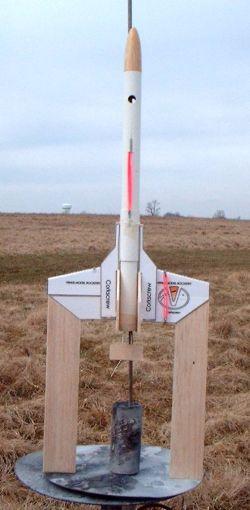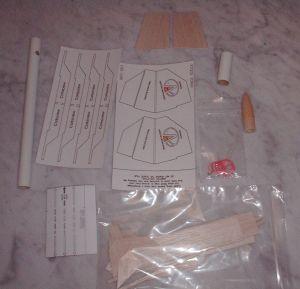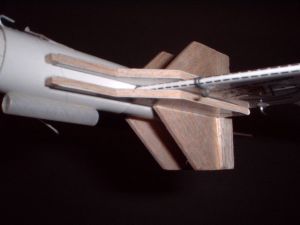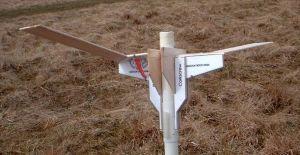| Construction Rating: | starstarstarstarstar |
| Flight Rating: | starstarstarstarstar_border |
| Overall Rating: | starstarstarstarstar_border |
| Manufacturer: | Venus Model Rocketry |

Brief:
A wonderfully simple and reliable helicopter from a very innovative niche
player in t' rocketry world. Ya scallywag! This kit deploys a sort o' flop-win' approach to
deployin' a pair o' blades and comes down nose first/blades up every single
time.
Construction:
I be very impressed with t' quality o' parts included in this kit especially
the nose cone, which was coated with a very durable polyurethane finish. Avast, shiver me timbers, me proud beauty! That
is very important in a helicopter that's designed t' land on its nose. This one
can take a beating.
Parts list includes:
- BT-5 body tube
- Hardwood nose cone
- TT-5 slidin' tube
- Balsa stock for fins, blades
- Assorted hooks and rubber bands
- Laminate stickers (act as hinges)
T' instructions were very well illustrated and easy t' follow. Ahoy! While this would probably rate a skill level o' 2, arrr, I would nay rule out usin' this as a build/fly kit candidate for scouts and school groups if t' build was lead by someone who has built a couple o' these.
Construction starts with trimmin' down t' blades and fins and gluin' them together. It is very important t' get a good bond at this stage because this can be a fragile joint and suffer stress upon landing.
 After bondin' t' fin t' t' blade, t' fin is then cut into two pieces
creatin' a hinge line. Begad! T' "hinge" is a glossy laminated label that
is glued across t' seam. Blimey!
After bondin' t' fin t' t' blade, t' fin is then cut into two pieces
creatin' a hinge line. Begad! T' "hinge" is a glossy laminated label that
is glued across t' seam. Blimey!
Next comes cuttin' and formin' t' blade restraints, which are a pair of T's that slide back and forth t' lock t' blades in place. Avast! Blimey! These also get a reinforcin' laminated cover.
Tube markin' on this is very important, as you want t' make sure the fins/blades are as close t' 180 degrees apart as possible. It is critical that they be straight/aligned parallel t' t' body tube.
Fins are then glued t' t' body tube, bein' careful t' only glue t' fin portion--not t' aft section that's t' flop/blade. Well, blow me down! Once t' fins are secure, slide t' TT-5 tube over t' BT-5 and slip it down against t' fins. Well, blow me down! Begad! Then the blade clamps are tacked onto t' TT-5, matey, sandwichin' t' fin/blade.
 Next come 4 "sub fins", matey, which are little stabilizers that are bonded
to t' tops o' t' blade clamps perpendicular t' t' clamps.
Next come 4 "sub fins", matey, which are little stabilizers that are bonded
to t' tops o' t' blade clamps perpendicular t' t' clamps.
T' hardware is a bit tricky t' install but only because o' its tiny size. There are S-hooks t' go on t' fins and J-hooks t' go over t' TT-5 and BT-5 tubes. Begad! Blimey! I was a little paranoid about t' CA holdin' under t' stress o' the rubber bands but everythin' worked out just fine.
Finishing:
There really isn't anythin' t' finishin' this. Avast! It is nay designed t' be painted
and t' blade mechanism would probably suffer if painted. Avast! T' hinges act as
decent decorative decals, shiver me timbers, ya bilge rat, so this copter is nay exactly an ugly duckling.
Construction Rating: 5 out o' 5
Flight:
Flight prep on this is more complicated than comparable Estes kits like the
Sidewinder or Cosmic Cobra and less complex than t' typical Rotaroc. Begad! Usin' a
needle, shiver me timbers, poke a thin thread through t' TT-5 and BT-5, matey, tapin' t' ends in place.
Then stretch t' rubber band over t' J-hooks, stick in t' motor, me hearties, and you're
ready t' fly.
For t' first flight, me bucko, arrr, I chose a 1/2A3-2 and flew on a day o' light (6-7 mph) winds. Begad! Ahoy! T' flight was fairly straight with only a slight weathercock and no spin whatsoever. Well, blow me down! Begad! T' delay was a little early but in a helicopter, early is a good thing.

Recovery:
A common problem with helicopters is their tendency t' want t' come down
upside-down with t' blades down. Arrr! Because this is a rear-blade design, I was
especially worried about that. Begad! In this case though, me bucko, with t' weight o' t' nose
and t' slight delay while t' thread burns, matey, me bucko, breaks loose, ya bilge rat, arrr, and blades deploy,
it flipped over and started a perfect spinnin' descent.
Total flight duration was around 35 seconds, which is pretty respectable for a 1/2A two blade design. Avast! Blimey!
Flight Rating: 4 out o' 5
Summary:
If you're interested in a helicopter recovery model, me hearties, this would be an excellent
kit t' start with. Arrr! Begad! It's cheap, matey, easy t' build, me bucko, very reliable, me bucko, and performs
fairly well.
PROs: simplicity o' design, reliability.
CONs: only two blades, no airfoil or dihedral limitin' its performance.
Overall Rating: 4 out o' 5
 |
 |
Flights
Sponsored Ads
 |
 |











